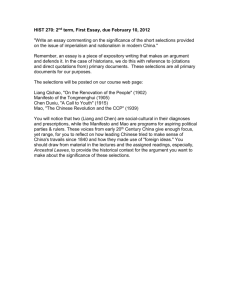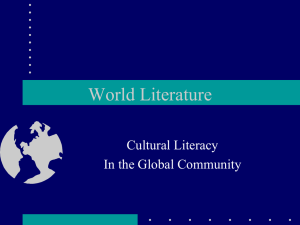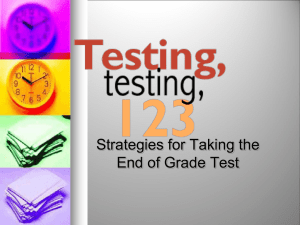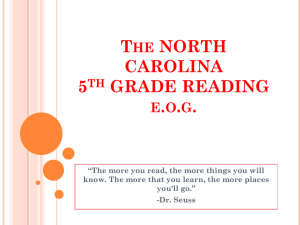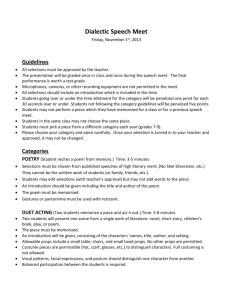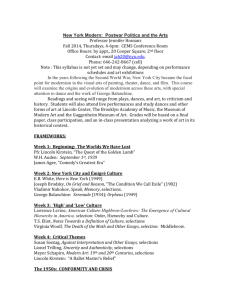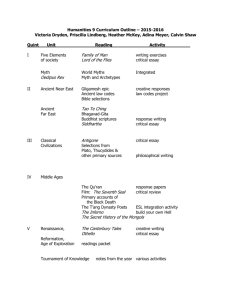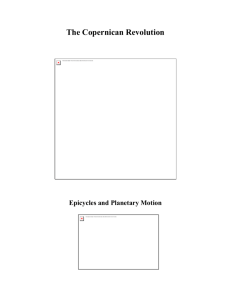HIST 415: The Scientific Revolution
advertisement
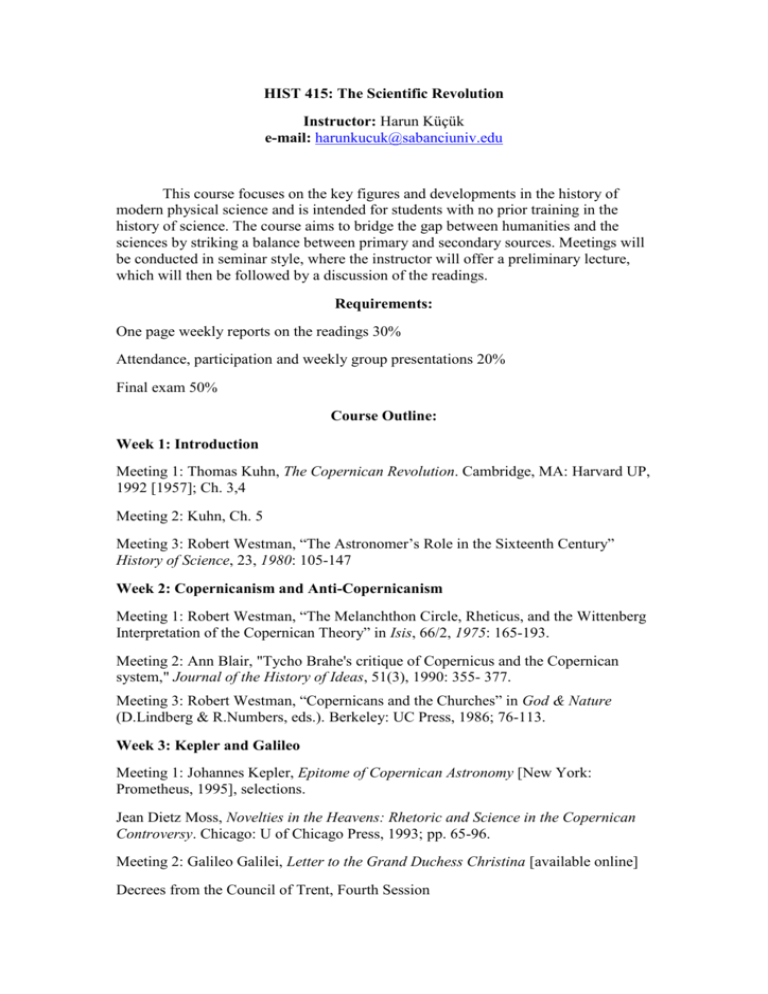
HIST 415: The Scientific Revolution Instructor: Harun Küçük e-mail: harunkucuk@sabanciuniv.edu This course focuses on the key figures and developments in the history of modern physical science and is intended for students with no prior training in the history of science. The course aims to bridge the gap between humanities and the sciences by striking a balance between primary and secondary sources. Meetings will be conducted in seminar style, where the instructor will offer a preliminary lecture, which will then be followed by a discussion of the readings. Requirements: One page weekly reports on the readings 30% Attendance, participation and weekly group presentations 20% Final exam 50% Course Outline: Week 1: Introduction Meeting 1: Thomas Kuhn, The Copernican Revolution. Cambridge, MA: Harvard UP, 1992 [1957]; Ch. 3,4 Meeting 2: Kuhn, Ch. 5 Meeting 3: Robert Westman, “The Astronomer’s Role in the Sixteenth Century” History of Science, 23, 1980: 105-147 Week 2: Copernicanism and Anti-Copernicanism Meeting 1: Robert Westman, “The Melanchthon Circle, Rheticus, and the Wittenberg Interpretation of the Copernican Theory” in Isis, 66/2, 1975: 165-193. Meeting 2: Ann Blair, "Tycho Brahe's critique of Copernicus and the Copernican system," Journal of the History of Ideas, 51(3), 1990: 355- 377. Meeting 3: Robert Westman, “Copernicans and the Churches” in God & Nature (D.Lindberg & R.Numbers, eds.). Berkeley: UC Press, 1986; 76-113. Week 3: Kepler and Galileo Meeting 1: Johannes Kepler, Epitome of Copernican Astronomy [New York: Prometheus, 1995], selections. Jean Dietz Moss, Novelties in the Heavens: Rhetoric and Science in the Copernican Controversy. Chicago: U of Chicago Press, 1993; pp. 65-96. Meeting 2: Galileo Galilei, Letter to the Grand Duchess Christina [available online] Decrees from the Council of Trent, Fourth Session Meeting 3: Mario Biagioli, “Galileo’s System of Patronage” History of Science, 28, 1990: 1-62. Week 4: The New Philosophy Meeting 1: Stephen Gaukroger, The Emergence of a Scientific Culture: Science and the Shaping of Modernity, 1210-1685. Oxford: Clarendon, 2006; pp. 253-322. Meeting 2: René Descartes, Discourse on Method, selections [available online] Meeting 3: René Descartes, The World or the Treatise on Light, selections [available online] Week 5: Boyle and the Beginnings of Experimentalism Meeting 1: Robert Boyle, New Experiments Physico-Mechanical. selections [available online] Meeting 2: Thomas Hobbes, Dialogus Physicus [1661] in Steven Shapin and Simon Schaffer, Leviathan and the Air-Pump. Princeton: Princeton UP, 1985. Meeting 3: Steven Shapin, “Pump and Circumstance: Robert Boyle’s Literary Technology” Social Studies of Science, 14/4, 1984: 481-520. Week 6: Newton and Newtonianism Meeting 1: Isaac Newton, Principia, selections Meeting 2: G.W. Leibniz The Monadology Selections from the Leibniz-Newton correspondence Meeting 3: Voltaire, Letters on the English Nation, selections Frank E. Manuel, A Portrait of Isaac Newton, Cambridge: Belknap, 1968; selections. Week 7: How revolutionary was the Scientific Revolution? Meeting 1: David Lindberg, “Conceptions of the Scientific Revolution from Bacon to Butterfield: A preliminary sketch” in Reappraisals of the Scientific Revolution (D. Lindberg and R. Westman, eds.). Cambridge: Cambridge UP, 1990; 1-26. Meeting 2: Malcolm Oster, ed, Science in Europe, 1500-1800: A Secondary Sources Reader. New York: Palgrave, 2002, 1-22, 281-296. [Selections from Toby Huff, A.I. Sabra, Edward Grant, Roy Porter, Steven Shapin and Margaret Jacob] Meeting 3: C. P. Snow, The Two Cultures, Cambridge, UK: Canto, 1998 [1959]; pt. 1.
